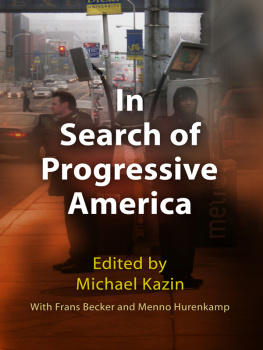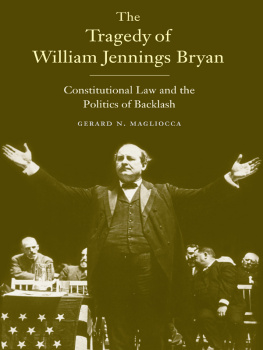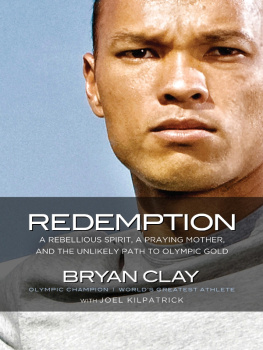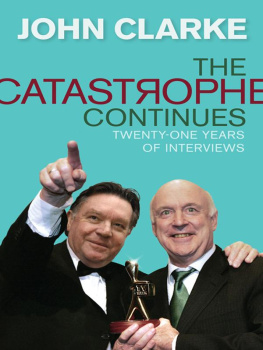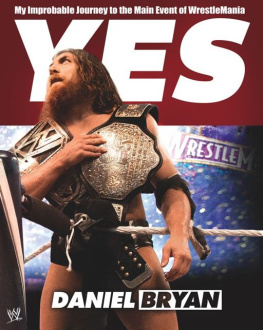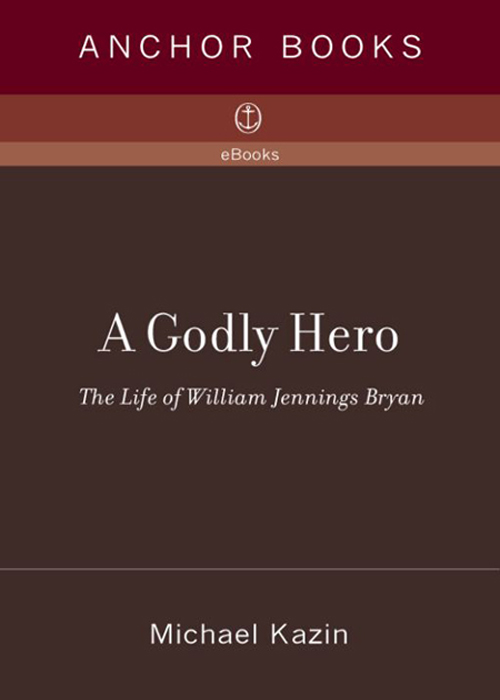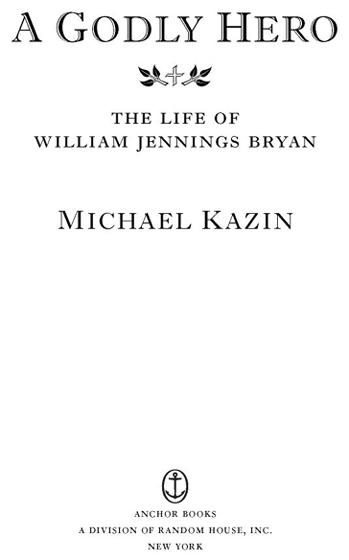Contents
For Beth, of course
Praise for Michael Kazins A GODLY HERO
Kazin, a superb political historian, trains a powerful searchlight on Bryans career and the social and political trends of the time. The New York Times Book Review
Fascinating.... Kazin resurrects one of the most astonishing careers in American politics.... Bryan and his time seem so much a mirror image of todays political landscape, with the parties and the blue and red states reversed. The Dallas Morning News
A fine book.... Mr. Kazin succeeds in rescuing Mr. Bryans reputation from H. L. Menckens mocking laughter. The Wall Street Journal
Kazins scholarship is impeccable and his understanding of the period profound. His gracefully written portrait brings a nearly forgotten figure to life. The New York Review of Books
[An] engaging biography.... A Godly Hero... is excellent history. Kazin brings a politically complex Bryan to life and vividly re-creates the political milieu in which his supporters and opponents operated. However we ultimately evaluate Bryans politics, Kazin leaves no doubt as to his pivotal role in the forging of modern American politics. Chicago Tribune
A subtle, affecting, even elegiac biography. Harpers Magazine
Thoroughly researched and well-written.... [A] sweeping and fascinating biography.... Kazin asks us to think of Bryan... in his prime, when he grappled with issues that are as hauntingly familiar today as they were more than a century ago. The Baltimore Sun
Superb.... In his excellent biography, Michael Kazin... portrays the real William Jennings Bryan, a politician beloved by millions. The Philadelphia Inquirer
Rich, delicious history.... Fabulously researched.... Michael Kazin gives us a wonderful new history and large political appraisal of Bryan. Lincoln Journal Star
A fresh perspective.... A richly textured narrative with an excellent pace.... Kazin is not the first biographer to tackle the Great Commoner, but he is definitely the best writer. The Christian Science Monitor
Rescue[s] Bryan from a condescension worse than oblivion.... Kazins revisionist biography not only emphasizes the Nebraska Democrats political progressivism but also clarifies its roots in Christian ethics. San Francisco Chronicle
A masterful job.... Kazin is an indispensable guide.... I hope neopopulists and those representing todays Democratic factions read Kazins fine book. Ed Kilgore, The Washington Monthly
Michael Kazins cogently argued new biography... destroys the caricature of Bryan the religious zealot and nave Democrat even as it shows Bryan the man and the orator taking on a stature that makes him a precursor of the New Deal.... Among the best features of Mr. Kazins biography are his quotations from letters written to Bryan. The New York Sun
An artfully written and captivating work of popular historical writing. Newsday
Timely.... A stirring reminder of a significant life.... The first full biography of the subject in nearly forty years. The Atlanta Journal-Constitution
Kazin... tells a rollicking story and brings back the resonant echoes of a glorious political voice. Wilson Quarterly
ACKNOWLEDGMENTS
In the mid-1990s, when this book was just an idea, I asked a distinguished Washington journalist what he thought of it. People will not understand, he responded with pitch-perfect disdain. Fortunately, I found a number of people and institutions who did grasp what I was trying to write and made it possible for me to write it.
The Woodrow Wilson International Center for Scholarsparticularly Michael Lacey, its former grand impresario of United States studies funded a year of research and sublime scholarly fellowship. Georgetown University provided a generous grant that helped me complete the leisurely crawl through the archives. My colleagues at the GU history department first welcomed me and then reminded me how much I had left to learn. The John Simon Guggenheim Memorial Foundation awarded the fellowship that enabled me to complete the first draft of the manuscript.
Other historians, archivists, and authors supplied hints, details, and wisdom. Richard John planted the idea in my mind during the first Gulf War, when our adjoining offices looked out on Colonial Williamsburg. Neil Basen sent along key Populist documents, Andy Rieser tutored me about the mysteries of Chautauqua, and David Brion Davis told me a few things about his Bryan-loving grandfather. Karl Moore of the Illinois State Archives and Harold Boyles of the Marion County Genealogical and Historical Society helped me understand the history of Salem during Bryans youth. Barbara Sommer shared her work about Mary Baird Bryan, and Arva Parks sent me a thick bundle of clippings about the couples life in Miami. Nick Hollis introduced me to several descendants of the Commoner and kept the flame of Bryans memory flickering. Jack Randorff explained the mysteries of acoustics to a nonscientist. I am also grateful for the work and advice of the people at the Nebraska State Historical Society, the Special Collections division of the library at the University of Tennessee, Knoxville, and to Jovanna Frazier, at Georgetowns Lauinger Library. The expert and witty archivists at the Manuscript Division of the Library of Congress tolerated my presence at their tables month after month, and year after year.
This is the first book for which I had research assistants. But the resourcefulness and good humor of Siobhan McNeil, Kate Delimitros, Sarah Snyder, and Laura Wacker made me regret that I took so long to seek help.
Audiences at the University of Delaware, the University of California at Santa Barbara, Brown University, Hokkaido University, and the Georgetown University Law Center invited me to spout off about Bryan and his times. As the book began to take shape, I was able to seek correction from some of Americas more gifted historians: Victoria Bissell Brown, Tony Fels, Richard Fox, Robert Johnston, Lawrence Levine, Joseph McCartin, and Katherine Kish Sklar. Jun Furuya, one of Japans leading Americanists, offered his own critique; he also invited me to participate in several wonderful conferences.
Steve Fraser and Julie Greene made acute, encouraging comments on big chunks of the manuscript. Eric Alterman, Nick Salvatore, and Grant Wacker accepted the burden of reading the whole thing. This clich is on the mark: their help was invaluable. I am particularly grateful to Grant for his knowledge and enthusiasmand for welcoming a political junkie into his fellowship of religious historians.
Serious biographers of Mr. Bryan belong to a tiny, endangered species. But four were willing to inform and inspire me. No one knows more about Gilded Age Nebraska and Bryan historiography than does Robert Cherny, my old colleague from San Francisco days. Paolo Coletta, the founding father of Bryan studies and author of the fullest work about the man, drove me around Annapolis one foggy day, dropping anecdotes faster than I could jot them down. During a long Pasadena afternoon, Rudd Brown told stories about her famous grandfather and once-famous mother I could have learned nowhere else. I eagerly await her biography-memoir of her family. Larry Levinewhose first book is the smartest study of WJB ever written is the most generous of scholars.
My agent, Sandy Dijkstra, guided me through the shoals and rapids of trade publishing with a rare combination of passion and good sense. The first piece of advice she gave me ought to be pasted above every writers desk: One cannot assume interest.


